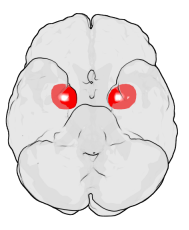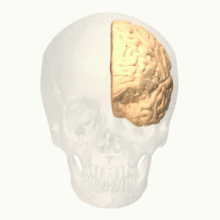User:Wnt/Samizdat/Differences between conservative and liberal brain
(Differences between conservative and liberal brain is currently up for deletion; archiving the article with my recent additions in case I want to try a merge.)


Several studies have sought to find differences between the structure or functions of people's brain who identify as conservatives and liberals.
Structural differences
[edit]Nature Neuroscience in 2007 reported a study[1] by scientists at New York University and UCLA that showed that political orientation is related to differences in how the brain processes information. According to UCLA neurologist Dr. Marco Iacoboni, the study showed "there are two cognitive styles -- a liberal style and a conservative style."[2] The article "Neurocognitive correlates of liberalism and conservatism"[1] published in Nature Neuroscience "found that greater liberalism was associated with stronger conflict-related anterior cingulate activity, suggesting greater neurocognitive sensitivity to cues for altering a habitual response pattern."[1]
According to a 2011 study[3] by cognitive neuroscientist Ryota Kanai's group[4] at University College London published in Current Biology, people with different political views have different brain structure.[5] The scientists performed MRI scans on 90 volunteer young adult people's brains.[6] According to ABC, "Scans revealed that the liberal students tended to have a larger region of the brain that processes conflicting information. That, say the authors, might make for tolerance to uncertainty in more liberal views. The conservatives tended to have a larger part of the brain that processes fear and identifies threats. They might be more inclined to integrate conservative views into their politics." The results of the study showed that conservatives had a larger amygdala,[7] a almond-shaped structure of brain that processing and memory of emotional reactions.[8] Liberals had increased grey matter in the anterior cingulate cortex,[7] a comma-shaped structure of the brain that plays a role in a wide variety of autonomic functions, such as regulating blood pressure and heart rate, as well as rational cognitive functions, such as reward anticipation, decision-making, empathy[9] and emotion.[10][11] As a result of these structural differences, liberals may be more efficient at managing conflicting information, while conservatives may be more efficient at recognizing threats.[6][12][13] However, the researchers concluded, "It's very unlikely that actual political orientation is directly encoded in these brain regions."[13] Goddiscussion.com pointed out that the study gives no explanation for socially liberal, fiscally conservative or apolitical people.[14]
In an earlier fMRI study published in Social Neuroscience, three different patterns of brain activation were found to correlate with individualism, conservatism, and radicalism.[15] In general, fMRI responses in several portions of the brain have been linked to viewing of the faces of well-known politicians.[16] However, others believe that determining political affiliation from fMRI data is overreaching.[17]
Functional assays
[edit]According to the ASA, IQ data from the "Add Health" survey averaged 106 for adolescents identifying as "very liberal", versus 95 for those calling themselves "very conservative".[18][19][20][21][22][23][24] An unrelated study in 2009 found that among students applying to U.S. universities, conservatism correlated negatively with SAT, Vocabulary, and Analogy test scores though there was a greater correlation with economic differences.[25]
In a survey of the perceived severity of moral transgressions, conservatives were more affected by the taste of a bitter drink than liberals.[26] "...taste perception significantly affected moral judgments, such that physical disgust (induced via a bitter taste) elicited feelings of moral disgust. Further, this effect was more pronounced in participants with politically conservative views".
Persistance of patterns
[edit]A study by scientists at New York University and the University of California, Los Angeles found differences in how self-described liberal an conservative research participants responded to changes in patterns.[27][28] Participants were asked to tap a keyboard when the letter 'M' appeared on a computer monitor and to refrain from tapping when they saw a 'W.' The letter 'M' appeared four times more frequently than W, conditioning participants to press the keyboard on almost every trial. Liberal participants made fewer mistakes than conservatives when they saw the rare W, indicating to the researchers that these participants were better able to accept changes or conflicts in established patterns.
The participants were also wired to an electroencephalograph that recorded activity in their anterior cingulate cortex, the part of the brain that detects conflicts between a habitual tendency and a more appropriate response. Liberals were significantly more likely than conservatives to show activity in the brain circuits that deal with conflicts during the experiment, and this correlated with their greater accuracy in the test.
References
[edit]- ^ a b c David M Amodio, John T Jost, Sarah L Master & Cindy M Yee, Neurocognitive correlates of liberalism and conservatism, Nature Neuroscience. Cited by 69 other studies
- ^ Study finds left-wing brain, right-wing brain - latimes.com
- ^ R. Kanai; et al. (2011-04-05). "Political Orientations Are Correlated with Brain Structure in Young Adults". Curr Biol. 21 (8): 677–680. doi:10.1016/j.cub.2011.03.017. PMC 3092984. PMID 21474316.
{{cite journal}}: Explicit use of et al. in:|author=(help) - ^ Is Your Brain Liberal or Conservative? - FoxNews.com
- ^ Left brain, right brain: researchers link neurology to political orientation
- ^ a b Liberal vs. Conservative: Does the Difference Lie in the Brain? – TIME Healthland
- ^ a b Political Orientations Are Correlated with Brain Structure in Young Adults Ryota Kanai, Tom Feilden, Colin Firth and Geraint Rees. Science Direct
- ^ Amunts K, Kedo O, Kindler M, Pieperhoff P, Mohlberg H, Shah N, Habel U, Schneider F, Zilles K (2005). "Cytoarchitectonic mapping of the human amygdala, hippocampal region and entorhinal cortex: intersubject variability and probability maps". Anat Embryol (Berl). 210 (5–6): 343–52. doi:10.1007/s00429-005-0025-5. PMID 16208455. S2CID 6984617.
{{cite journal}}: CS1 maint: multiple names: authors list (link) - ^ Zimbardo begins Heroic Imagination Project, Stanford Daily, Jan 7, 2011
- ^ Decety, J., & Jackson, P.L. (2004). "The functional architecture of human empathy. Behavioral and Cognitive Neuroscience Reviews". 3: 71–100.
{{cite journal}}: Cite journal requires|journal=(help)CS1 maint: multiple names: authors list (link) - ^ Jackson P.L., Brunet E., Meltzoff A.N., Decety J. (2006). "Empathy examined through the neural mechanisms involved in imagining how I feel versus how you feel pain: An event-related fMRI study". Neuropsychologia. 44: 752–61. doi:10.1016/j.neuropsychologia.2005.07.015. PMID 16140345. S2CID 6848345.
{{cite journal}}: CS1 maint: multiple names: authors list (link) - ^ The liberal brain? Scans show liberals and conservatives have different brain structures - New York Daily News
- ^ a b Politics on the Brain: Scans Show Whether You Lean Left or Right | Political Psychology | Liberals & Conservatives | LiveScience
- ^ Liberal or Conservative? Research finds a difference in the brain | God Discussion
- ^ Zamboni, G.; Gozzi, M.; Krueger, F.; Duhamel, J. R.; Sirigu, A.; Grafman, J. (2009). "Individualism, conservatism, and radicalism as criteria for processing political beliefs: a parametric fMRI study". Social Neuroscience. 4 (5): 367–383. doi:10.1080/17470910902860308. PMID 19562629. S2CID 15652205. Zamboni G, Gozzi M, Krueger F, Duhamel JR, Sirigu A, Jordan Grafman. National Institutes of Health, Bethesda, MD, USA
- ^ Kristine Knudson; et al. (March 2006). "Politics on the Brain: An fMRI Investigation". Social Neuroscience. 1 (1). PubMed preprint (Soc Neurosci): 25–40. doi:10.1080/17470910600670603. PMC 1828689. PMID 17372621.
{{cite journal}}: Explicit use of et al. in:|author=(help) - ^ Aue, T.; Lavelle, L. A.; Cacioppo, J. T. (2009). "Great expectations: What can fMRI research tell us about psychological phenomena?". International Journal of Psychophysiology : Official Journal of the International Organization of Psychophysiology. 73 (1): 10–16. doi:10.1016/j.ijpsycho.2008.12.017. PMID 19232374.
- ^ "Intelligent People Have "Unnatural" Preferences and Values That Are Novel in Human Evolutionary History". American Sociological Association press release. 2010-02-23.
- ^ Satoshi Kanazawa (2010). "Why Liberals and Atheists Are More Intelligent". Social Psychology Quarterly. 73: 33–57. doi:10.1177/0190272510361602. S2CID 2642312.
- ^ "Liberals and Atheists Smarter? Intelligent People Have Values Novel in Human Evolutionary History, Study Finds". ScienceDaily. 2010-02-24.
- ^ Elizabeth Landau (2010-02-26). "Liberalism, atheism, male sexual exclusivity linked to IQ". CNN.
- ^ John Cloud (2010-02-26). "Study: Are Liberals Smarter Than Conservatives?". Time Magazine.
- ^ "Higher IQ linked to liberalism, atheism". UPI. 2010-03-02.
- ^ Nicole Baute (2010-03-01). "Are liberals and atheists smarter? Psychologist links teen IQ levels with adult views on religion, politics and family". Toronto Star.
- ^ Larry Stankov (May 2009). "Conservatism and cognitive ability". Intelligence. 37 (3): 294–304. doi:10.1016/j.intell.2008.12.007.
- ^ Eskine, K. J.; Kacinik, N. A.; Prinz, J. J. (2011). "A bad taste in the mouth: Gustatory disgust influences moral judgment". Psychological Science. 22 (3): 295–299. doi:10.1177/0956797611398497. PMID 21307274. S2CID 16108542.
- ^ "Brains of Liberals, Conservatives May Work Differently". Psych Central. 2007-10-20.
- ^ "Study finds left-wing brain, right-wing brain". Los Angeles Times. 2007-09-10.
External links
[edit]
